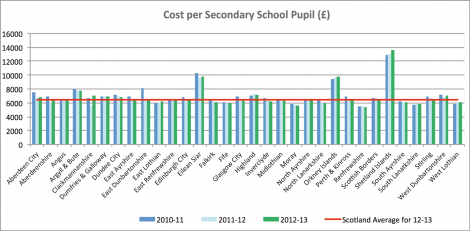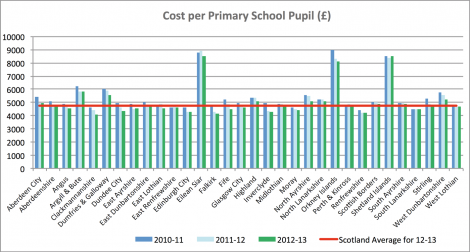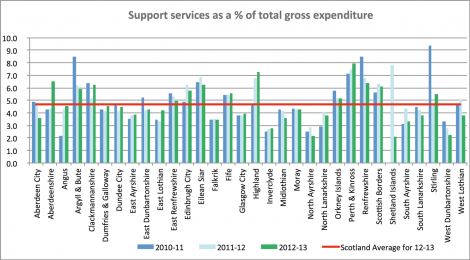News / Pressure still on SIC despite huge savings
SHETLAND Islands Council looks set to balance its books and meet its ambitious savings targets at least one year ahead of schedule.
However, as Pete Bevington reports, this success is not likely to reduce pressure to keep cutting costs, especially in education where the council is now examining why secondary schools are so much more expensive than on Scotland’s other islands.
This week the council revealed that it had brought down the draw on its oil reserves to its lowest level in more than a decade.
This follows a massive drive to cut spending that has seen the SIC’s workforce shrink by more than 600 people, a cut of 21 per cent.
The council is now drawing £42,000 a day from its oil-funded deposits, down from around £100,000 a day three years ago, but still £16,000 a day more than it can afford.
SIC leader Gary Robinson said that he expects the council to reduce that figure to a sustainable level by the end of the next financial year in March 2016, more than a year before the target date of the council elections in May 2017.
Yet community resistance remains strong against a major plank in the council’s savings drive, the closure or reduction in size of rural schools which would remove £3 million from the budget.
Hundreds of people are expected to march through Lerwick on 7 June to protest against the plans to remove S3 and S4 from Shetland’s five junior high schools and to close four rural primaries.
Robinson said the major financial question facing the islands was the huge disparity in the cost of educating secondary school pupils in Shetland compared to the other Scottish islands.
Here the cost per secondary pupil was almost £14,000 last year, having increased by around £1,000 over the previous three years.
Become a member of Shetland News
This is over £3,000 more than it costs per pupil in the western isles and Orkney and around double the Scottish average.
In comparison the cost of primary pupils is on a par with the other Scottish islands, while still far more than the rest of Scotland.
“I am the first to accept that education will always be more expensive to deliver in rural areas, but we should not be that much more than the other islands,” Robinson said.
“We are having a bit of work done to bottom out why we are more expensive, but my suspicion is that in other areas they have reduced the number of schools and teachers because the number of pupils has fallen.
“In Shetland, because we have had the money to keep all the schools and teachers we have not done that, but we should soon have the data to prove whether or not that is the case.”
Robinson also refuted suspicions that the SIC wasted money on managers and office staff, pointing out that it had the lowest support service costs in the whole of Scotland.
“We have done quite a lot of work taking out the backroom costs and in the latest benchmarking report it’s absolutely clear that we are number one in Scotland for the lowest cost backroom services across all 32 local authorities.”
He also warned against following the example of Police Scotland who cut clerical staff to the point that officers were having to spend time filling in forms rather than on police duties.
Meanwhile, he added, the last two years had seen “a real cultural change within the organisation” following the SOFIE exercise to Suss Out Further Internal Efficiencies, and an internal marketplace had developed using the council’s internal “intranet” system.
“People are really thinking about how they spend money. Budget holders are being much more careful around items they dispose of and items they purchase.
“It’s not that long ago that one department would be disposing of something while another department was ordering a new one. We also used to see a spike in spending at the end of the year, but that’s not happened so much in the last two years.”
He also called for some perspective on the school closure proposals, arguing that while Shetland was debating the future of 10 pupil primaries, other authorities were questioning the viability of 10 pupil class sizes.
“We could meet our savings without closing schools, but you would be leaving schools with incredibly small budgets.
“The budgets have already been squeezed so much that the standard of education is, I think, beginning to suffer and if we are not careful I think we could be in line for a poor inspection report unless we take some of these tough decisions.
“There has to be a realisation here that we can either have education or we can keep schools open, but we don’t have the resources to do both.”
There have been whisperings of the council changing tack once again on the junior high schools, reducing them to S1 to S3 establishments to fit in more closely with Education Scotland’s demands for Curriculum for Excellence (CoE).
Robinson also said the council had to recognise that while the number of school pupils was declining, the number of elderly people in care was on the rise.
“I think it’s absolutely right that we seek to redirect resources away from services where demand is falling towards a service that is increasing,” he said.
Meanwhile he thanked elected members for their resolve, council staff for their hard work and the Shetland public for adapting to “the necessary changes we have made so far”.
The council has managed to cut its annual spend by £38 million in the last two and a half years, but has also been faced with increases in the yearly cost of staff wages, fuel bills and rising prices.
As a result it has only been able to reduce its draw on council reserves from £36 million to £15.4 million a year.
Those inflationary costs will be exacerbated by further cuts in grants from central government, keeping the pressure on to save money at every opportunity.
Finance manager James Gray says the council can only afford to spend 4.8 per cent of its reserves per year, giving it £9.6 million from its current pot of £200 million.
“We must bear in mind that bringing the council to a stage where it’s living within its means is just the first challenge,” Robinson said.
“As we go through the decade, it is almost inevitable that the amount of money we get from government will significantly reduce.
“That will be a challenge to every local authority in the country, but I’m confident that these figures show we will be able to face that challenge from a robust and affordable position.”
Become a member of Shetland News
Shetland News is asking its readers to consider paying for membership to get additional perks:
- Removal of third-party ads;
- Bookmark posts to read later;
- Exclusive curated weekly newsletter;
- Hide membership messages;
- Comments open for discussion.
If you appreciate what we do and feel strongly about impartial local journalism, then please become a member of Shetland News by either making a single payment, or setting up a monthly, quarterly or yearly subscription.


























































